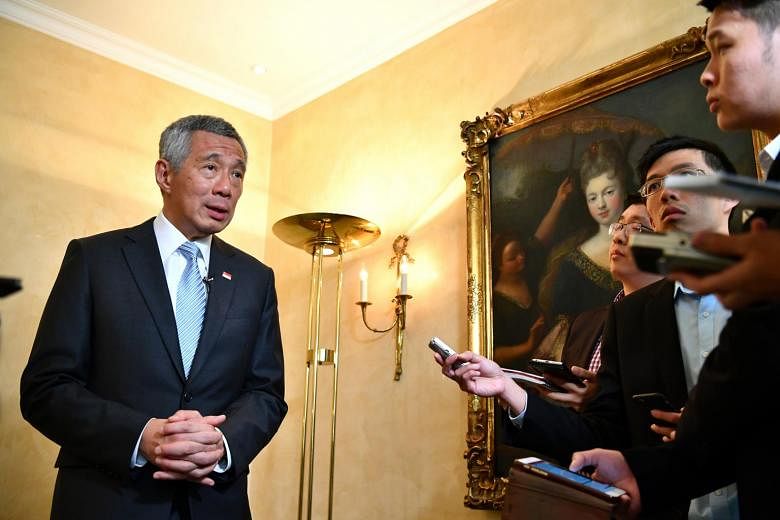Singapore has a responsibility to highlight important issues of concern to the country, deal with them and push its position on them, Prime Minister Lee Hsien Loong has said.
Doing so is particularly crucial when Singapore's security, safety or fundamental interests regarding its position in the world - such as the rule of international law and the peaceful resolution of disputes - are at stake, he added.
"If we don't stand up and be counted, you cannot lie low and hope that nobody will notice you.
"That is how Singapore must conduct our foreign policy," he told Singapore reporters on Monday when asked about the role of small states in processes like the Group of 20 (G-20) summit.
His comments, in an interview wrapping up his six-day work visit to Germany, come amid a debate in Singapore on how small states should behave, with one school of thought stating that they should not comment on issues that do not directly involve them. This was in reference to how Singapore could have handled better its comments on the South China Sea dispute.
Without citing the debate, Mr Lee made the point that even as Singapore, a small country, has to take the world as it is, it also has to protect its interests and do the best for itself in the world. "These two are complementary, they are not contradictory. We have to be aware of the realities, but at the same time that does not mean surrendering ourselves to our fate," he said.
Singapore can contribute by having "something to bring to the table" and working with other countries towards a common cause.
It can do it with other small and medium-sized countries in the Global Governance Group (3G), or big countries in the G-20, he added.
"That is to our advantage, and our voice is heard and we are able to protect and advance our interests."
At the G-20 summit in Hamburg last weekend, Mr Lee called on leaders of the world's major economies to stay committed to strengthening multilateral trade and redistribute its benefits more equally.
He also urged small countries to band together to make their collective voices heard, and achieve their shared interests.
Reflecting on the summit, Mr Lee said it was productive and fruitful from Singapore's perspective.
Singapore, which is not a G-20 member, was invited as convener of the 3G - an informal group of 30 small and medium-sized countries.
"We got our point of view across, we explained what we needed to say on trade, on digitalisation, on jobs," said Mr Lee. "At the same time, I got useful meetings with the people whom I had hoped to meet."
Mr Lee met several world leaders at the summit.
From the broader G-20 perspective, he said, the communique reflected a difference in views and tensions between the United States and the other 19 members. US President Donald Trump rolled back on traditional positions held by the US, pursuing an "America first" policy on trade, and pulling his country out of the Paris climate agreement. So, while the communique reflected a compromise on trade with a pledge to keep markets open and combat protectionism, it also showed the vast chasm between the US and other members on climate change.
"These are very big problems, and the starting points from both sides are very different, so I don't believe these problems will be resolved very quickly," Mr Lee said.
Elaborating on Singapore's foreign policy, he said it has generally moved in the right direction, but has to adjust as the world changes.
"If there is a new government in America, you have to consider what that means for the world; as China becomes more influential, we have to consider how we can develop our relationship with China," he said.
Singapore's foreign policy was in the spotlight recently when Ambassador-at-Large Bilahari Kausikan criticised a commentary by Professor Kishore Mahbubani, dean of the Lee Kuan Yew School of Public Policy. Prof Mahbubani wrote that "small states should behave like small states", and urged discretion and restraint in commenting on matters involving great powers. Mr Bilahari said this view was "muddled, mendacious and indeed dangerous".
Mr Lee did not cite the exchange, but said debates will be "most fruitful" if people speak sincerely and with conviction about their beliefs.

